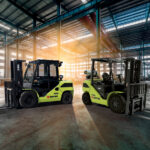Mercedes-Benz Vans and Rivian join forces
Mercedes-Benz Vans and Rivian join forces
Mercedes-Benz and Rivian have signed a Memorandum of Understanding for a strategic partnership and joint production of electric vans. The objective? To set the standard in sustainable and all-electric transportation.
Mercedes-Benz Vans – a full range provider of electric private and commercial vans – and electric vehicle manufacturer Rivian, have announced a Memorandum of Understanding signed to initiate a strategic partnership. This partnership will enable the companies to cooperate on the production of electric vans.
Subject to the parties entering into final binding agreements and obtaining the relevant regulatory clearances, they intend to establish a new joint venture (JV) manufacturing company with the purpose of investing in, and operating, a factory in Europe to produce large electric vans for both Mercedes-Benz Vans and Rivian, starting in a few years. The target is to build an all-new electric-only production facility, leveraging an existing Mercedes-Benz site in Central or Eastern Europe.
The companies envisage production-optimised vehicle designs for efficient manufacturing on common assembly lines. They will aim to produce two large van models, the first based on Mercedes-Benz Vans’ electric-only platform VAN.EA (MB Vans Electric Architecture) and the other based on Rivian’s second generation electric-van, the Rivian Light Van (RLV) platform. Further options will also be explored for increased synergies.
The JV mirrors the common objectives of Mercedes-Benz Vans and Rivian: both companies plan to rapidly scale up the production of electric vans to help the world transition to cleaner transportation. By working together, they will be able to leverage operational synergies and substantially increase cost efficiency to help make the vans more affordable for commercial customers driven by total cost of ownership.
RJ Scaringe, CEO of Rivian, explains that his company was formed to create compelling products and services that will encourage the world to transition away from fossil fuel consumption. “We’re delighted to be partnering with Mercedes-Benz on this project. Mercedes-Benz is one of the world’s best known and respected automotive companies, and we believe that together we will produce truly remarkable electric vans which will not only benefit our customers, but the planet,” he enthuses.
Mathias Geisen, head of Mercedes-Benz Vans, is equally upbeat about the partnership. “As a pioneer in the field of locally emission-free transportation, Mercedes-Benz Vans has gained broad experience in producing and launching eVans since 2010. Now we are accelerating the transformation to a fully electric product portfolio; from 2025 onwards, all vans based on our new architecture VAN.EA will be electric-only,” he says.
“I am delighted that as part of this transformation we are now joining forces with Rivian – a highly dynamic and inspiring partner with a strong technology position,” Geisen continues. “We are sharing investments and technology because we also share the same strategic ambition: accelerating the electrification of the van market with sustainable and superior products for our customers.”
Mercedes-Benz Vans has firmly anchored its leadership aspiration for electric mobility in its strategy. With Vito E-CELL in 2010, Mercedes-Benz Vans was a pioneer in the field of locally emission-free transporters. Today, customers can choose from four battery-electric driven vans: the eVito Panel Van, the eSprinter, the eVito Tourer, and the EQV.
With the new eCitan and the upcoming EQT, the van portfolio will soon be completely electrified, while the next generation eSprinter will be launched in 2023. From the middle of the decade, Mercedes-Benz Vans will implement VAN.EA as the next stage in its electrification strategy.
Published by
Focus on Transport
focusmagsa




